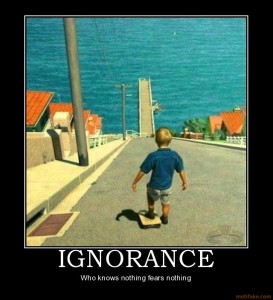Escaping the ignorance spiral
Honesty about performance, complete transparency about whether or not you’re doing it well. I think it’s a human right.”
– Jeff Immelt
Our son is in a phase in which he believes he is right about everything. He will correct or contradict just about anything I say, including the color of the sky. It’s cute until it’s not. His confidence on subjects he knows almost nothing about can be staggering.
The Germans have a word, fremdschämen, which is that feeling when you are in the presence of someone who should feel embarrassed for themselves, yet simply is not. And so you feel simultaneously horrified and embarrassed in their place. It’s that feeling you get when watching terrible auditions on American Idol. I can get a hint of fremdschämen listening to my son prattle on about subjects he is woefully ignorant of.
This ignorance can become a vicious cycle. As researchers Kruger and Dunning discovered, those students who scored in the bottom quartile estimated their mastery of the course material to fall in the 60th percentile. Just as 82% of drivers say they are in the top third of safe drivers, which is mathematically impossible. Or similarly a Bain study which revealed that while 80% of CEOs say their company delivers a “superior” product, only 8% of their own customers would agree.
And as Dunning and Kruger demonstrated, ignorance rewards confidence. But also, silence rewards ignorance. Yet, there may be a way out. In their study, once students had completed the test, the researchers gave half of the students a small tutorial on how to correctly solve the problems they were just presented. After the tutorial, the students were permitted to look over their own tests and self-evaluate their performance. Those students who received the tutorial on how to effectively solve the problems were much more accurately critical of their own performance.
Understanding this effect can often lead us to critically evaluate how astute or accurate others are, and take on the responsibility of correcting someone else. Wrong approach. Start with yourself. Critically self-evaluate your own performance, and seek ways to learn how to improve. Be the example you wish to see in the world.
Or as David Dunning himself put it so well, “The presence of the Dunning-Kruger effect, as it’s been come to be called, is that one should pause to worry about one’s own certainty, not the certainty of others.”
[For more on this subject, I recommend Chris Lee’s article here.]




